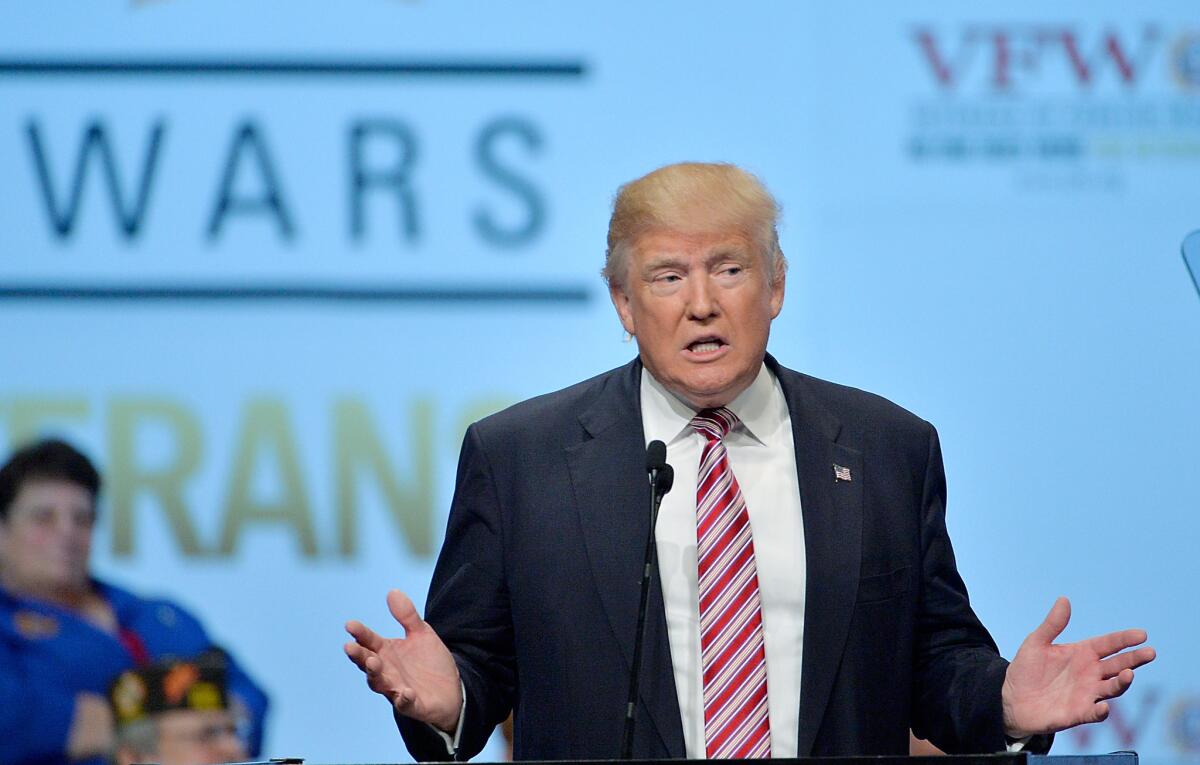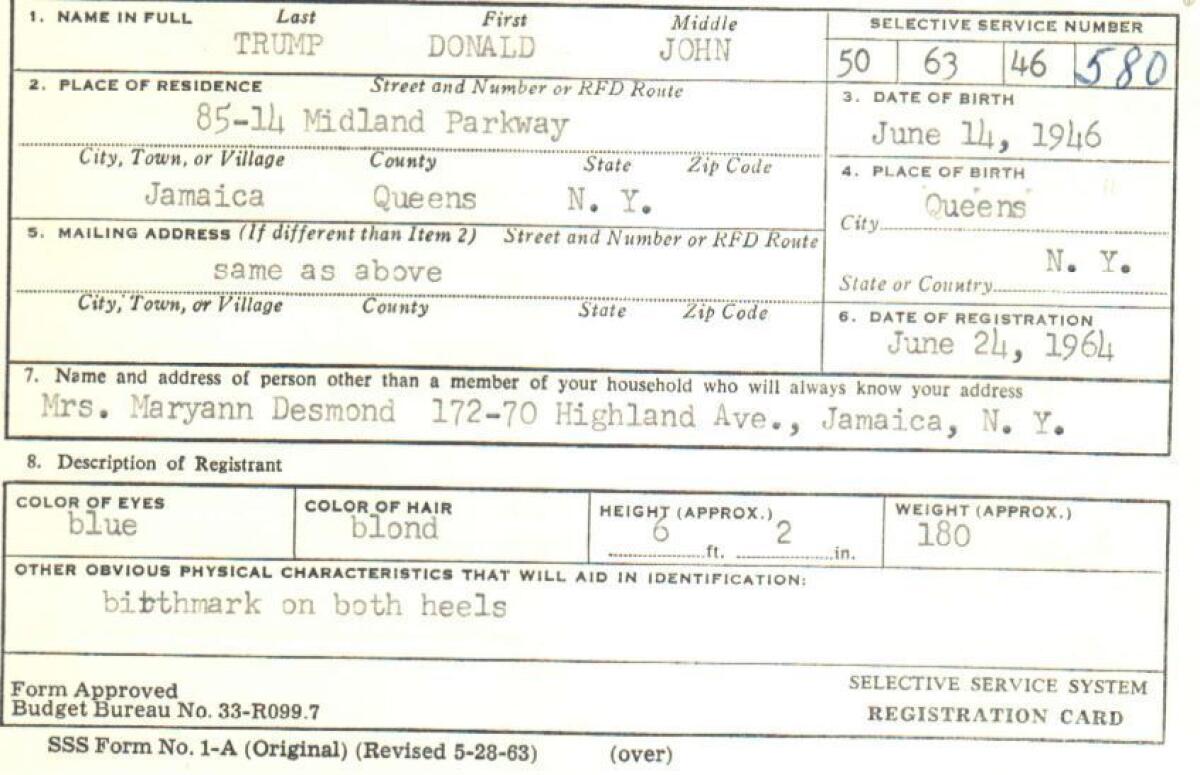How deferments protected Donald Trump from serving in Vietnam

- Share via
Donald Trump’s public feud with the Muslim family of a fallen soldier has drawn attention to the businessman’s own record of military service.
Khizr Khan delivered an emotional speech at the Democratic National Convention in which he told the story of his son, Humayun, who was killed in 2004 by a car bomb while serving in Iraq. In his remarks, Khan, with his wife at his side, said the Republican presidential nominee had “sacrificed nothing” for his country.
And in a response condemned by both Democrats and Republicans, Trump criticized the Gold Star parents and insisted his own “sacrifices” included creating jobs and helping establish a Vietnam War memorial in New York.
But for all of Trump’s boasting about his support from veterans, he has never served in the military, thanks to a string of deferments that enabled him to avoid the draft during the Vietnam War.
Here’s a look at what happened:
Trump graduates from New York Military Academy in 1964 as Vietnam War is ramping up.
At the military academy, Trump wore a uniform and participated in marching drills all four years, up until his graduation in the spring of 1964. In March 1965, the first U.S. combat troops arrived on the ground in Vietnam.
Shortly after his 18th birthday, Trump registered with the Selective Service on June 24, 1964. Federal law requires men at age 18 to register and be available for military draft. His Selective Service card noted that Trump was 6-foot-2 and 180 pounds. Under a section titled “physical characteristics” it stated that Trump has a birthmark on both heels.
Registering made Trump a candidate for a military draft, which was about to ramp up as U.S. involvement in Vietnam grew.
But Trump said he wanted to pursue his education so he could enter the real estate business and follow in the footsteps of his father, Fred, who had built a profitable company in New York.

College deferments during his years at Fordham and the University of Pennsylvania.
Trump decided to stay in New York, enrolling at Fordham University in the fall of 1964. He would remain there for two years, before transferring to the Wharton School at the University of Pennsylvania, where he would study business.
Trump received four education deferments while in school, according to the National Archives and Records Administration.
The first education deferment came on July 28, 1964, several weeks before he began his freshman year at Fordham. Trump received similar deferments his sophomore, junior and senior years.
The deferments ended once he graduated from Wharton, making the then-22-year-old Trump eligible to be drafted again.
After college, Trump receives a medical deferment.
Trump graduated in 1968, one of the most turbulent years of the war. He set his sights on returning to New York.
On Oct. 15, several months after his graduation that spring, Trump was granted a 1-Y medical deferment.
In an interview with the New York Times, Trump said the reason he received the medical deferment was because of bone spurs in his heels.
The National Archives and Records Administration does not specify the reason for the medical deferment, only that it resulted from a September 1968 physical exam that “disqualified” him from service.
“I had a doctor that gave me a letter — a very strong letter on the heels,” Trump told the New York Times.
Trump spokeswoman Hope Hicks declined to offer additional comment about the deferment.
Election 2016 | Live coverage on Trail Guide | Sign up for the newsletter
What’s a 1-Y medical deferment?
This deferment was handed out to individuals with health conditions that would have limited their effectiveness to serve. Those conditions, among others, included high blood pressure, severe asthma and allergies.
Registrants who received this deferment were deemed “not qualified for military service” by the Selective Service.
Trump’s high lottery number for the draft.
When the draft lottery for Vietnam began in December 1969, Trump was already shielded because of his medical deferment.
Over the years, Trump has offered few details about his deferments, but has sometimes said the reason he did not fight in Vietnam was because he was fortunate enough to receive a high lottery number.
“If I would have gotten a low number, I would have been drafted. I would have proudly served," he told ABC News last year. "But I got a number, I think it was 356. That’s right at the very end. And they didn't get -- I don’t believe -- past even 300, so I was -- I was not chosen because of the fact that I had a very high lottery number."
An official for the National Archives confirmed that Trump received a draft number of 356 out of 365.
But before that, Trump was protected from the draft for more than year by his 1-Y medical deferment.
The draft ended in 1973.
Listen to Trump talk about his draft number and deferments:
What are Trump’s views on not serving?
At a campaign rally in New Hampshire last year, after Trump had criticized the war record of Sen. John McCain for being captured and held prisoner in Vietnam, he expressed some guilt about having not served.
“I didn't serve, I haven't served," said Trump. "I always felt a little guilty."
Trump’s relations with veterans groups.
Trump has aggressively courted veterans in his presidential campaign and boasted of his contributions to veterans’ causes. But many of those donations remain undocumented.
Earlier this year, the Washington Post found that Trump had raised $3.1 million at a January fundraiser for veterans, despite proclaiming he had raised about $6 million. At that same fundraiser, Trump pledged to personally donate $1 million to veterans’ causes. Only after intense pressure and questions from reporters did Trump make good on his pledge four months later.
While speaking at the Veterans of Foreign Wars conference last month, Trump asserted he would be the best commander-in-chief that veterans have ever seen. “Our debt to you is eternal — yet our politicians have totally failed you,” he said.
Yet after his confrontation with the Khan family, the VFW issued a statement condemning Trump’s remarks.
“Election year or not, the VFW will not tolerate anyone berating a Gold Star family member for exercising his or her right of speech or expression,” said Brian Duffy, head of the veterans organization. “There are certain sacrosanct subjects that no amount of wordsmithing can repair once crossed.”
Numerous other Gold Star families called upon Trump to apologize, but he has said he does not regret responding to what he called Khan’s “vicious” attack against him.
At a Virginia rally Tuesday, a retired lieutenant colonel gave Trump his Purple Heart medal in a gesture of support. Trump thanked him and said, “I always wanted to get the Purple Heart. This was much easier.”
Follow @kurtisalee on Twitter
ALSO
Op-Ed: Why Trump can't tell the difference between a Twitter war and a presidential campaign
Foreign leaders long refrained from commenting on U.S. elections. Then Trump came along.
'A sense of panic is rising' among Republicans over Trump, including talk of what to do if he quits
Get the L.A. Times Politics newsletter
Deeply reported insights into legislation, politics and policy from Sacramento, Washington and beyond. In your inbox twice per week.
You may occasionally receive promotional content from the Los Angeles Times.








